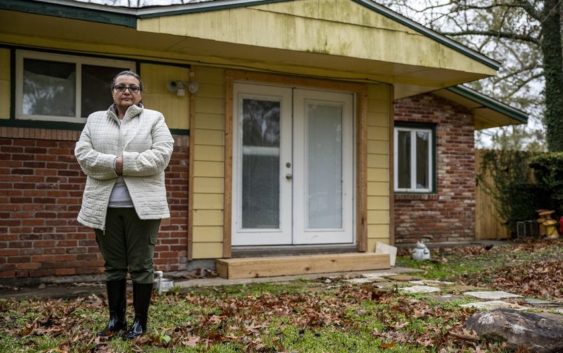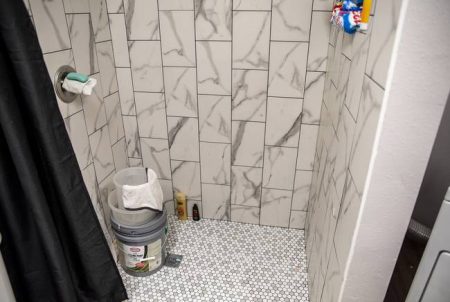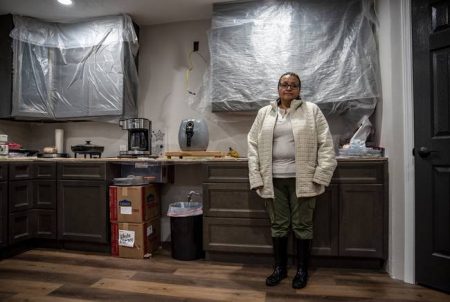- 'I made a terrible decision' | Video shows boaters in the middle of Chambers County tornado
- 'Everybody has to come out and do their part' | People pitch in to help tornado ravaged school in Alvin prepare temporary campus
- District collecting donations after tornado destroys elementary school in Alvin
- Lowe’s to distribute free tornado cleanup supplies in Kingwood Tuesday
- North Carolina extends FEMA aid deadline for Hurricane Helene victims
Galveston Advocates Warn Hundreds Could Miss Out On Hurricane Harvey Assistance

When Hurricane Harvey made landfall in August 2017, floodwaters marooned Christine Lopez at her cousin’s house for six days. The scene when she returned to her ranch-style home in Friendswood was devastating; at least 5 feet of water had ruined her family’s car, furniture, photos and documents and much of the house itself.
More than two years later, Lopez and her husband and 13-year-old son are still living in an RV while they make repairs to the house. The 50-year-old insurance saleswoman is hoping for help from a federally funded disaster recovery program that will stop accepting applicants at the end of the month.
But last week, Lopez learned that her application, which she submitted in December 2018, was denied because of missing paperwork. A state official said she failed to respond promptly after she was asked for additional documents in late October. Lopez maintains the agency lost track of documents she had turned in long before.
“What I’m upset about is that for nine months, what did they do? They didn’t work on my case, or I don’t know what was going on in the case,” Lopez said. “Then all of a sudden, you’re out of here.”
The state agency that administers the program denies Lopez’s claims and says it is efficiently distributing aid. But advocates from one disaster-recovery region are raising the alarm ahead of this month’s deadline, saying bureaucratic hurdles have thwarted some hurricane victims’ efforts. A November letter from Galveston County Recovers, a coalition of local governments, nonprofit groups and churches, asked the land office to extend the deadline.
“Barely a day goes by when we do not hear a client relating their difficulties in progressing their case,” the letter said, and many applicants have complained that “they are not given accurate or meaningful information or — often times — they are given no information at all.”
The Texas General Land Office, which administers the federally funded home repair programs, disputes the allegations. A spokesperson says the agency has already helped nearly 3,000 people get aid with homebuilding or home repair and expects that number to grow to roughly 10,000 before the programs end.
“The GLO is turning federal recovery funds into housing repairs and reimbursements for Harvey homeowners at a record pace,” Brittany Eck, the agency spokesperson, said.
“This misinformation campaign is misleading the public and unfortunately discouraging some applicants with remaining unmet need from Hurricane Harvey,” Eck said of the recovery group’s letter.
The land office oversees the Homeowner Assistance Program, which helps pay for repairs and home elevations for hurricane victims outside of Houston and Harris County, which received separate funds for recovery programs. It also runs the Homeowner Reimbursement Program, which reimburses hurricane victims up to $50,000 for certain out-of-pocket expenses on repairs.
The land office has approved nearly 2,000 Homeowner Assistance Program applications for construction, Eck said. Of those, more than 700 homes are under construction and nearly 400 homes are already completed. In the reimbursement program, about $31 million has gone to roughly 1,000 successful applicants so far. The relief programs are intended to prioritize low- and middle-income Texans and those who have an “urgent need.”
“Across 48 counties, we are running out of funds because we have effectively helped eligible applicants submit complete applications in order to get approved under federal requirements,” Eck said.
But advocates say hundreds of eligible applicants have been turned away for largely bureaucratic reasons, and they’ve laid blame at the feet of the state agency.
“There are many GLO-created roadblocks” that have contributed to a high number of applicants with unfinished applications, the local recovery group’s chair wrote.
Of the nearly 14,000 applications that have been opened in the Homeowner Reimbursement Program, roughly 7,500 applications were unfinished or “in draft” as of Dec. 5, according to the land office. The agency approved 957 completed applications and found that another 2,950 were ineligible for aid.
In Galveston County alone, the land office approved 103 applications and found 400 ineligible, while another 749 remained unfinished.
Kimbra Washington, who has worked as a hurricane recovery case manager at a nonprofit in the region, said a recurring complaint among her clients was that the land office or its contractors lost track of crucial, hard-to-replace documents such as proof of taxes or receipts for repair work done to their homes. Washington said she advised clients to make copies of their documents before turning anything over, but elderly and low-income storm victims with limited access to technology often struggle to do so.
Many applicants report being shuffled among multiple coordinators working for the land office because the agency’s employee turnover rate appears to be high, Washington said. Of 15 applicants she says she has advised, only two have been approved.
“They are getting frustrated, and I’m getting frustrated [along] with them,” Washington said. “It’s an all-around bad situation, so I hope the more we let people know what’s going on with GLO, maybe it’ll help them restructure something over there.”


In Lopez’s case, she and her family stayed with a friend for two months after the storm until they were able to move into a nearby rental house and began to make repairs to her home. Her family received three months of food stamps, she said, and donations poured in from church groups, her son’s school and the Red Cross to help with household items. There were some hiccups — she says she was defrauded by at least one contractor — but over time she and her husband, a skilled laborer, were able to make modest progress: leveling the floors, rewiring the entire electrical system, and installing new sheetrock and some plumbing fixtures.
Then she heard from her temporary landlord that her rent was going up by $400 per month. Two months later, the landlord raised it another $200. Unable to pay, Lopez and her family rented an RV after being evicted. They parked it in the driveway of their partially restored house, which lacks hot water. About twice a week, the family bathes at a neighbor’s house.
In October, she heard back from the land office about her application for homeowner assistance. Lopez said the agency wanted information about child-support payments that her husband had fallen behind on during a period of financial instability after the storm.
Lopez provided documents showing that the family was beginning to catch up on those payments, she said. But the land office also wanted 2018 income tax documents, which Lopez said she had provided almost a year before, and a self-certification of repairs, which Lopez said she promptly mailed to the agency.
On Dec. 3, the agency sent Lopez a letter saying her application had been denied because of the missing documents.
Eck said Lopez’s claims “are not factual” and that the agency made repeated efforts to reach her by phone and email to get hold of her missing paperwork, which was incomplete when it was “originally submitted.” The agency has been “very proactive in calling applicants in all counties with applications in draft status, trying to help them turn in the documents the program needs to get each one deemed eligible,” she said, including hosting outreach events and sending weekly emails to applicants with unfinished applications.
Lopez said she is appealing her rejection to the land office and will append a polite note to the effect of: “Please note this is my second time turning these things in.” She’s hopeful the agency will reconsider her application.
And if it doesn’t, Lopez says she’ll try to remain optimistic about finishing repairs to her home. “Guess what — my family’s already been through hell and back,” she said.
This article was originally published by The Texas Tribune.